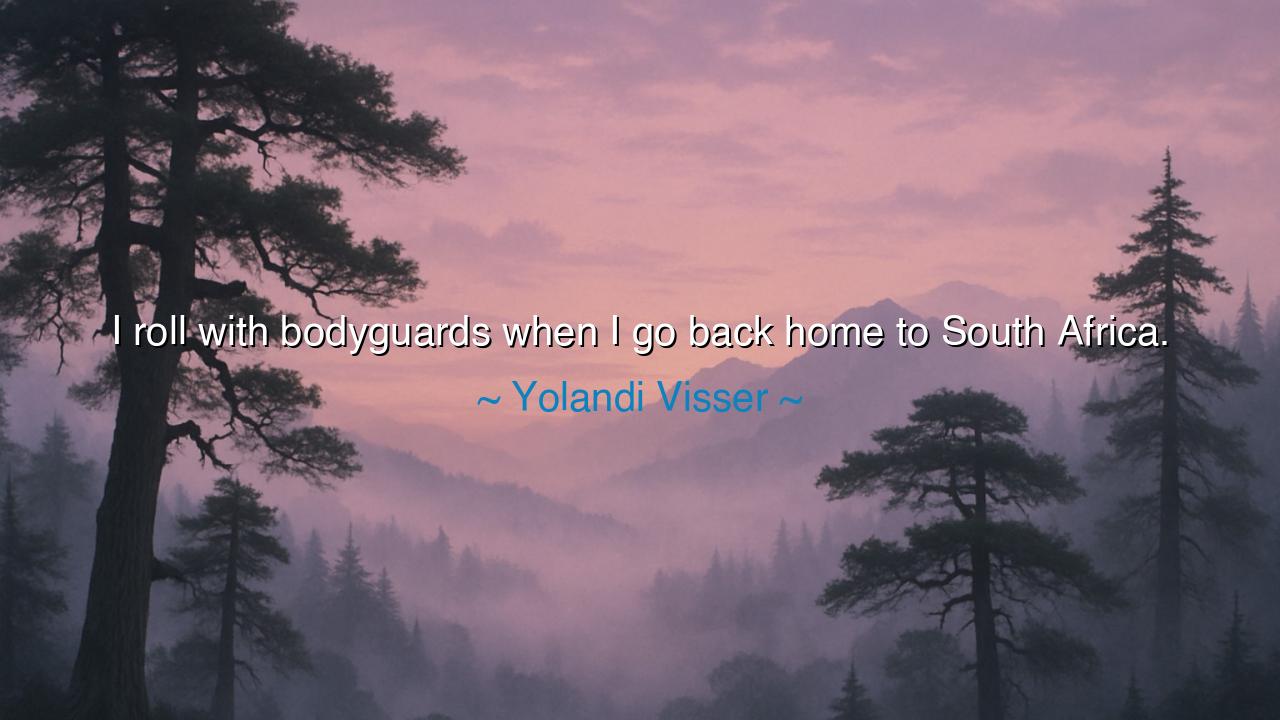
I roll with bodyguards when I go back home to South Africa.






The words of Yolandi Visser—“I roll with bodyguards when I go back home to South Africa”—speak with a bluntness that hides a deeper truth, one woven of both pride and fear, belonging and distance. On the surface, her words may seem like those of a celebrity protecting herself from danger. But beneath them lies something more ancient and universal: the paradox of homecoming—that to return home is not always to return to safety, and that even the soil that once cradled you can, in time, turn unfamiliar. Her statement is not boastful—it is a lament, a reminder that fame and home seldom coexist in peace.
To “roll with bodyguards” is to confess that trust has become fragile, that the innocence of one’s homeland has changed. In her South Africa—land of fire and beauty, struggle and rebirth—the world is as fierce as it is radiant. For Yolandi, a daughter of that land, fame has drawn both admiration and danger. Her words reveal the truth that great visibility invites great vulnerability. The one who rises high, who dares to be seen, must often pay for that light with distance, caution, and protection. What she speaks of, then, is not arrogance, but awareness: that even those who seem untouchable are never free from fear.
The ancients, too, knew this duality. The Greek hero Odysseus, after years of wandering, longed to return to Ithaca. Yet when he arrived at last, his home was filled with danger—strangers plotting in his hall, enemies waiting at his gate. To reclaim his place, he had to enter his own kingdom in disguise, armed and guarded, a stranger among his own. Yolandi’s words carry that same energy. She is Odysseus in modern form—returning to a homeland she loves, yet one that no longer feels entirely hers. The bodyguards are her shield, her disguise, her armor against a world that admires and fears her in equal measure.
But her quote also speaks of the price of transformation. For the one who leaves home and grows beyond it—whether artist, thinker, or wanderer—can never fully return as they once were. The people who knew you as one of them now see you through the mirror of your success. Their love is mixed with awe, their pride laced with suspicion. To be both famous and faithful to one’s roots is a delicate balance, for the more brightly one shines, the more the shadows stretch. In this way, Yolandi’s statement is not simply about safety; it is about the loneliness of recognition—the burden of being seen as more than human in the place that once saw you as its own.
There is, too, a reflection of her homeland itself in her words. South Africa—a nation of extraordinary spirit and enduring wounds—stands as both a cradle of beauty and a battlefield of history. To walk its streets as a public figure is to carry the weight of both privilege and peril. The bodyguards she mentions are not only a physical barrier but a symbol of the invisible armor we all build when the world becomes unpredictable. Each of us, in our own way, learns to shield our hearts from danger, to guard our dreams from envy, and to protect the tender parts of ourselves that fame—or even simple exposure—can wound.
Yet, her statement also carries a subtle strength. To return home, even with fear, is an act of courage. Many who find the world unsafe choose exile forever. But Yolandi does not renounce her homeland—she comes back, guarded but grounded, acknowledging both the love and the danger it holds. This, too, is the mark of the warrior spirit: not to flee from risk, but to walk through it wisely. The presence of bodyguards does not diminish her connection to her roots; it honors the reality of her world while preserving her right to belong within it.
The lesson, then, is both practical and profound: to love one’s home is not to idealize it, but to return to it with clear eyes and a brave heart. Whether your homeland is a place, a family, or a memory, understand that returning always requires courage. The world changes, and so do you. If safety demands caution, let caution walk beside love, not in its place. Protect yourself, but do not abandon what made you who you are. For even when we must shield ourselves, the act of coming home—of reclaiming our origins—is an act of faith in the enduring power of belonging.
So, my friends, take Yolandi’s words not as the boast of the guarded, but as the wisdom of the self-aware. In every age, those who shine must also defend their light. When you return to your beginnings, bring with you both reverence and readiness. Guard what must be protected—but never let fear rob you of the joy of homecoming. For in the balance between vigilance and love lies the courage of those who, like Yolandi Visser, carry the fire of home in their hearts, even when they must walk its streets with armor.






AAdministratorAdministrator
Welcome, honored guests. Please leave a comment, we will respond soon